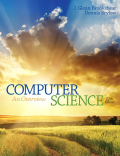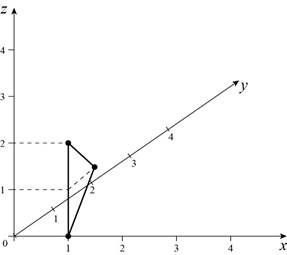
EBK COMPUTER SCIENCE: AN OVERVIEW
12th Edition
ISBN: 8220102744196
Author: BRYLOW
Publisher: PEARSON
expand_more
expand_more
format_list_bulleted
Question
Chapter 10, Problem 26CRP
Program Plan Intro
a.
Planer Patch:
The patch formed by joining points in the plane is called planer patch.
Planar patch for given question:

Explanation:
From the above diagram, the planer patch is parallel to “yz” plane. The points are viewed from outside of the object. So, the left most portion of the patch lies inside.
Explanation of Solution
b.
Determine a ray of light originating at the point (2, 0, 0):
The 3D plot of the patch with the point (2, 0, 0) is shown below:
Explanation of Solution
c.
Determine a ray of light originating at the point (2, 1, 1):
The 3D plot of the patch with the point (2, 1, 1) is shown below:
Explanation of Solution
d.
Determine a ray of light originating at the point (3, 2, 1):
The 3D plot of the patch with the point (3, 2, 1) is shown below:
Expert Solution & Answer
Want to see the full answer?
Check out a sample textbook solution
Students have asked these similar questions
Q12- A three phase transformer 3300/400 V,has D/Y connected and working on 50Hz. The line
current on the primary side is 12A and secondary has a balanced load at 0.8 lagging p.f. Determine
the i) Secondary phase voltage ii) Line current iii) Output power Ans. (230.95 V, 99.11 A, 54.94 kW)
make corrections of this program based on the errors shown. this is CIS 227 .
Create 6 users: Don, Liz, Shamir, Jose, Kate, and Sal.
Create 2 groups: marketing and research.
Add Shamir, Jose, and Kate to the marketing group.
Add Don, Liz, and Sal to the research group.
Create a shared directory for each group.
Create two files to put into each directory:
spreadsheetJanuary.txt
meetingNotes.txt
Assign access permissions to the directories:
Groups should have Read+Write access
Leave owner permissions as they are
“Everyone else” should not have any access
Submit for grade:
Screenshot of /etc/passwd contents showing your new users
Screenshot of /etc/group contents showing new groups with their members
Screenshot of shared directories you created with files and permissions
Chapter 10 Solutions
EBK COMPUTER SCIENCE: AN OVERVIEW
Ch. 10.1 - Prob. 1QECh. 10.1 - Prob. 2QECh. 10.1 - Prob. 3QECh. 10.2 - Prob. 1QECh. 10.2 - Prob. 2QECh. 10.2 - Prob. 3QECh. 10.3 - Prob. 1QECh. 10.3 - Prob. 2QECh. 10.3 - Prob. 3QECh. 10.3 - Prob. 4QE
Ch. 10.3 - Prob. 5QECh. 10.4 - Prob. 1QECh. 10.4 - Prob. 2QECh. 10.4 - Prob. 3QECh. 10.4 - Prob. 4QECh. 10.4 - Prob. 5QECh. 10.5 - Prob. 1QECh. 10.5 - Prob. 2QECh. 10.5 - Prob. 3QECh. 10.5 - Prob. 4QECh. 10.6 - Prob. 1QECh. 10.6 - What is a storyboard?Ch. 10.6 - Prob. 3QECh. 10.6 - Prob. 4QECh. 10 - Prob. 1CRPCh. 10 - Prob. 2CRPCh. 10 - Prob. 3CRPCh. 10 - Prob. 4CRPCh. 10 - Prob. 5CRPCh. 10 - Prob. 6CRPCh. 10 - Prob. 7CRPCh. 10 - Prob. 8CRPCh. 10 - Prob. 9CRPCh. 10 - Prob. 10CRPCh. 10 - Prob. 11CRPCh. 10 - Prob. 12CRPCh. 10 - Prob. 13CRPCh. 10 - Prob. 14CRPCh. 10 - Prob. 15CRPCh. 10 - Prob. 16CRPCh. 10 - Prob. 17CRPCh. 10 - Prob. 18CRPCh. 10 - Prob. 19CRPCh. 10 - Prob. 20CRPCh. 10 - Prob. 21CRPCh. 10 - Prob. 22CRPCh. 10 - Prob. 23CRPCh. 10 - Prob. 24CRPCh. 10 - Prob. 25CRPCh. 10 - Prob. 26CRPCh. 10 - Prob. 27CRPCh. 10 - Prob. 28CRPCh. 10 - Prob. 29CRPCh. 10 - Prob. 30CRPCh. 10 - Prob. 31CRPCh. 10 - Prob. 32CRPCh. 10 - Prob. 33CRPCh. 10 - In what way does the hardware in a computer...Ch. 10 - Prob. 35CRPCh. 10 - Prob. 36CRPCh. 10 - Prob. 37CRPCh. 10 - Prob. 38CRPCh. 10 - Prob. 39CRPCh. 10 - Prob. 40CRPCh. 10 - Prob. 41CRPCh. 10 - Prob. 42CRPCh. 10 - Prob. 43CRPCh. 10 - Prob. 44CRPCh. 10 - Prob. 1SICh. 10 - The following questions are intended as a guide to...Ch. 10 - Prob. 3SICh. 10 - Prob. 4SI
Knowledge Booster
Similar questions
- ⚫ your circuit diagrams for your basic bricks, such as AND, OR, XOR gates and 1 bit multiplexers, ⚫ your circuit diagrams for your extended full adder, designed in Section 1 and ⚫ your circuit diagrams for your 8-bit arithmetical-logical unit, designed in Section 2. 1 An Extended Full Adder In this Section, we are going to design an extended full adder circuit (EFA). That EFA takes 6 one bit inputs: aj, bj, Cin, Tin, t₁ and to. Depending on the four possible combinations of values on t₁ and to, the EFA produces 3 one bit outputs: sj, Cout and rout. The EFA can be specified in principle by a truth table with 26 = 64 entries and 3 outputs. However, as the EFA ignores certain inputs in certain cases, it is easier to work with the following overview specification, depending only on t₁ and to in the first place: t₁ to Description 00 Output Relationship Ignored Inputs Addition Mode 2 Coutsjaj + bj + Cin, Tout= 0 Tin 0 1 Shift Left Mode Sj = Cin, Cout=bj, rout = 0 rin, aj 10 1 1 Shift Right…arrow_forwardShow the correct stereochemistry when needed!! mechanism: mechanism: Show the correct stereochemistry when needed!! Br NaOPh diethyl ether substitutionarrow_forwardIn javaarrow_forward
- KeanPerson #keanld:int #keanEmail:String #firstName:String #lastName: String KeanAlumni -yearOfGraduation: int - employmentStatus: String + KeanPerson() + KeanPerson(keanld: int, keanEmail: String, firstName: String, lastName: String) + getKeanld(): int + getKeanEmail(): String +getFirstName(): String + getLastName(): String + setFirstName(firstName: String): void + setLastName(lastName: String): void +toString(): String +getParkingRate(): double + KeanAlumni() + KeanAlumni(keanld: int, keanEmail: String, firstName: String, lastName: String, yearOfGraduation: int, employmentStatus: String) +getYearOfGraduation(): int + setYearOfGraduation(yearOfGraduation: int): void +toString(): String +getParkingRate(): double In this question, write Java code to Create and Test the superclass: Abstract KeanPerson and a subclass of the KeanPerson: KeanAlumni. Task 1: Implement Abstract Class KeanPerson using UML (10 points) • Four data fields • Two constructors (1 default and 1 constructor with all…arrow_forwardPlz correct answer by best experts...??arrow_forwardQ3) using the following image matrix a- b- 12345 6 7 8 9 10 11 12 13 14 15 1617181920 21 22 23 24 25 Using direct chaotic one dimension method to convert the plain text to stego text (hello ahmed)? Using direct chaotic two-dimension method to convert the plain text to stego text?arrow_forward
- : The Multithreaded Cook In this lab, we'll practice multithreading. Using Semaphores for synchronization, implement a multithreaded cook that performs the following recipe, with each task being contained in a single Thread: 1. Task 1: Cut onions. a. Waits for none. b. Signals Task 4 2. Task 2: Mince meat. a. Waits for none b. Signals Task 4 3. Task 3: Slice aubergines. a. Waits for none b. Signals Task 6 4. Task 4: Make sauce. a. Waits for Task 1, and 2 b. Signals Task 6 5. Task 5: Finished Bechamel. a. Waits for none b. Signals Task 7 6. Task 6: Layout the layers. a. Waits for Task 3, and 4 b. Signals Task 7 7. Task 7: Put Bechamel and Cheese. a. Waits for Task 5, and 6 b. Signals Task 9 8. Task 8: Turn on oven. a. Waits for none b. Signals Task 9 9. Task 9: Cook. a. Waits for Task 7, and 8 b. Signals none At the start of each task (once all Semaphores have been acquired), print out a string of the task you are starting, sleep for 2-11 seconds, then print out a string saying that you…arrow_forwardProgramming Problems 9.28 Assume that a system has a 32-bit virtual address with a 4-KB page size. Write a C program that is passed a virtual address (in decimal) on the command line and have it output the page number and offset for the given address. As an example, your program would run as follows: ./addresses 19986 Your program would output: The address 19986 contains: page number = 4 offset = 3602 Writing this program will require using the appropriate data type to store 32 bits. We encourage you to use unsigned data types as well. Programming Projects Contiguous Memory Allocation In Section 9.2, we presented different algorithms for contiguous memory allo- cation. This project will involve managing a contiguous region of memory of size MAX where addresses may range from 0 ... MAX - 1. Your program must respond to four different requests: 1. Request for a contiguous block of memory 2. Release of a contiguous block of memory 3. Compact unused holes of memory into one single block 4.…arrow_forwardusing r languagearrow_forward
- Programming Problems 9.28 Assume that a system has a 32-bit virtual address with a 4-KB page size. Write a C program that is passed a virtual address (in decimal) on the command line and have it output the page number and offset for the given address. As an example, your program would run as follows: ./addresses 19986 Your program would output: The address 19986 contains: page number = 4 offset = 3602 Writing this program will require using the appropriate data type to store 32 bits. We encourage you to use unsigned data types as well. Programming Projects Contiguous Memory Allocation In Section 9.2, we presented different algorithms for contiguous memory allo- cation. This project will involve managing a contiguous region of memory of size MAX where addresses may range from 0 ... MAX - 1. Your program must respond to four different requests: 1. Request for a contiguous block of memory 2. Release of a contiguous block of memory 3. Compact unused holes of memory into one single block 4.…arrow_forwardusing r languagearrow_forwardWrite a function to compute a Monte Carlo estimate of the Beta(3, 3) cdf, and use the function to estimate F(x) for x = 0.1,0.2,...,0.9. Compare the estimates with the values returned by the pbeta function in R.arrow_forward
arrow_back_ios
SEE MORE QUESTIONS
arrow_forward_ios
Recommended textbooks for you
 Systems ArchitectureComputer ScienceISBN:9781305080195Author:Stephen D. BurdPublisher:Cengage Learning
Systems ArchitectureComputer ScienceISBN:9781305080195Author:Stephen D. BurdPublisher:Cengage Learning C++ for Engineers and ScientistsComputer ScienceISBN:9781133187844Author:Bronson, Gary J.Publisher:Course Technology Ptr
C++ for Engineers and ScientistsComputer ScienceISBN:9781133187844Author:Bronson, Gary J.Publisher:Course Technology Ptr- COMPREHENSIVE MICROSOFT OFFICE 365 EXCEComputer ScienceISBN:9780357392676Author:FREUND, StevenPublisher:CENGAGE LProgramming Logic & Design ComprehensiveComputer ScienceISBN:9781337669405Author:FARRELLPublisher:Cengage
 A+ Guide to Hardware (Standalone Book) (MindTap C...Computer ScienceISBN:9781305266452Author:Jean AndrewsPublisher:Cengage Learning
A+ Guide to Hardware (Standalone Book) (MindTap C...Computer ScienceISBN:9781305266452Author:Jean AndrewsPublisher:Cengage Learning


Systems Architecture
Computer Science
ISBN:9781305080195
Author:Stephen D. Burd
Publisher:Cengage Learning

C++ for Engineers and Scientists
Computer Science
ISBN:9781133187844
Author:Bronson, Gary J.
Publisher:Course Technology Ptr

COMPREHENSIVE MICROSOFT OFFICE 365 EXCE
Computer Science
ISBN:9780357392676
Author:FREUND, Steven
Publisher:CENGAGE L

Programming Logic & Design Comprehensive
Computer Science
ISBN:9781337669405
Author:FARRELL
Publisher:Cengage

A+ Guide to Hardware (Standalone Book) (MindTap C...
Computer Science
ISBN:9781305266452
Author:Jean Andrews
Publisher:Cengage Learning